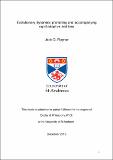Evolutionary dynamics promoting and accompanying rapid adaptive trait loss
Abstract
Understanding the conditions which promote adaptation is a key goal of evolutionary biology, and a pressing issue across fields of biology. Addressing this involves investigating not just the genetic and developmental mechanisms through which adaptive phenotypes arise, but also the environmental and ecological conditions which promote their spread. A major challenge in addressing these aims is that contemporary examples of rapid adaptive evolution are difficult to study, owing to the difficulty of identifying traits under selection during the early stages of adaptation. In this thesis, I use a Hawaiian field cricket system which provides a useful exception; males of the species Teleogryllus oceanicus ordinarily sing to attract females, however adaptive male-silencing (‘flatwing’) phenotypes have recently emerged and spread on at least three islands, under selection against male song exerted by a parasitoid fly, Ormia ochracea, which is attracted to singing males. Prior work indicates at least two of these flatwing phenotypes, from islands of Kauai and Oahu, have evolved independently under this shared selection pressure. This example of rapid, convergent evolution provides an opportunity to identify conditions which have promoted and resulted from rapid adaptation in wild populations evolving under extreme selection pressure. I investigate features which have contributed to the ability of these populations to rapidly, and repeatedly, adapt under strong selection against male song. The results indicate convergent sexual trait loss has been promoted by sex-biased development pathways maintained by sexually antagonistic selection; that pleiotropic, or associated, effects of adaptive mutation(s) in both sexes have played an important role in their spread; that adaptive male song-loss phenotypes have evolved repeatedly, above and beyond flatwing morphology; and that silent males nevertheless invest as much energy in practicing wing movement patterns associated with song and, despite reduced sexual dimorphism, are just as likely to be involved in aggressive intrasexual contests.
Type
Thesis, PhD Doctor of Philosophy
Collections
Description of related resources
Evolutionary dynamics promoting and accompanying rapid adaptive trait loss (thesis data) Rayner, J.G., University of St Andrews, 2019. DOI: https://doi.org/10.17630/a48c198a-5575-44bb-a682-2f3ee4f32b3fPascoal , S , Risse , J E , Zhang , X , Blaxter , M , Cezard , T , Challis , R J , Gharbi , K , Hunt , J , Kumar , S , Langan , E , Liu , X , Rayner , J G , Ritchie , M G , Snoek , B L , Trivedi , U & Bailey , N W 2020 , ' Field cricket genome reveals the footprint of recent, abrupt adaptation in the wild ' , Evolution Letters , vol. 4 , no. 1 , pp. 19-33 . https://doi.org/10.1002/evl3.148
Items in the St Andrews Research Repository are protected by copyright, with all rights reserved, unless otherwise indicated.

